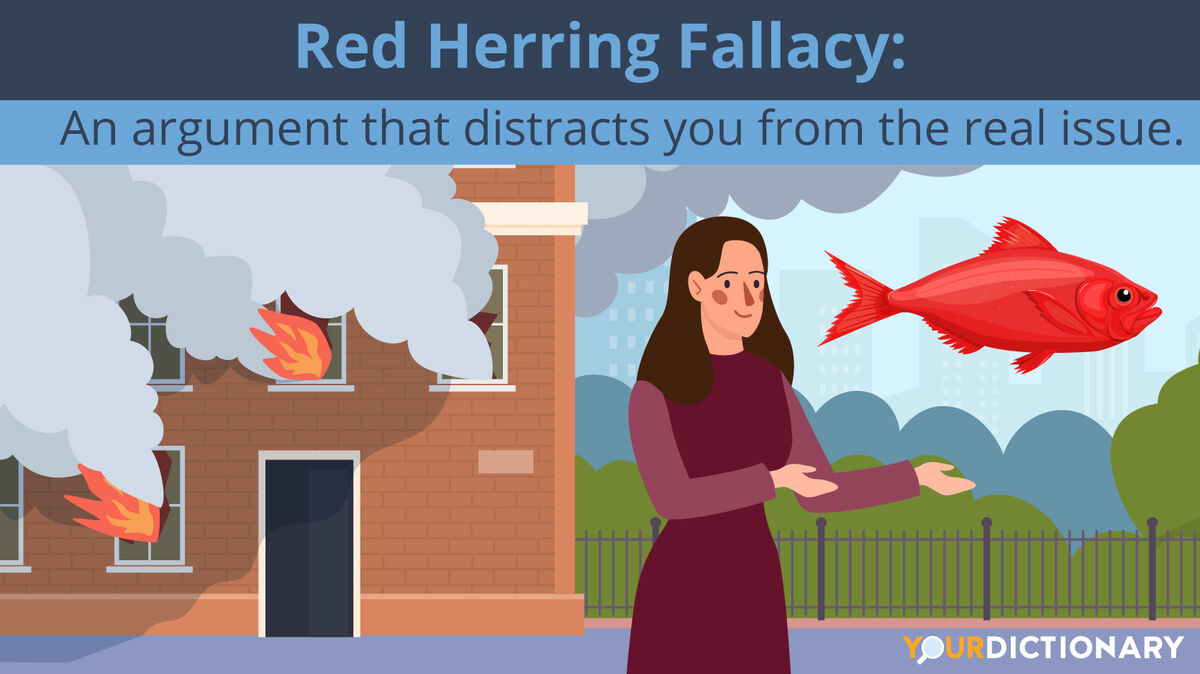
The phrase “red herring” comes from a 19th-century story about using the smell of a herring to distract dogs from chasing a rabbit. Today, the literary and rhetorical device called a red herring refers to distracting a reader or listener with a seemingly (but not actually) relevant argument. For example, a mystery author might strongly hint that a butler character is the killer, only to include a surprise ending with the wife as the culprit. In an argument, the red herring fallacy diverts a main argument by focusing on a detail and forming a new argument. Chances are, you hear examples of the red herring fallacy every day — and you might even use it yourself.
Everyday Red Herring Fallacy Examples
Have you ever complained about your day and someone jumped in to say “You think that’s bad? Try commuting for two hours in the pouring rain!” Congratulations — you’ve just found a red herring in the wild. More everyday examples of the red herring fallacy include:
Distracting a child - “You’re right, that toy in the toy shop looks really fun. Let’s go home and see what fun toys we have there!”
Convincing a parent to lend you the car - “I know you don’t want me to borrow the car, but I was going to pick up coffee for you. Don’t you love coffee?”
Complaining about prices - “How can you charge that much for a burrito? Don’t you care about people who are hungry and can’t afford a gourmet burrito?”
Rationalizing a purchase - “Yes, I bought an RV without your permission, but look at the trip I’ve already planned! We’ll have so much fun!”
Getting out of trouble - “Why are you pulling me over for speeding? Shouldn’t you be out catching the real criminals? Someone could be robbing a bank as we speak!”
Turning the conversation around to yourself - “I’m so excited for your wedding. It’s in the same location as my wedding, which was so fun because I invited my whole family and all my friends and we partied all night long. Do you want to see pictures?”
Changing plans - “We could definitely go to the pizza place for dinner. But have you heard about the new sushi restaurant just across the street? It’s supposed to be amazing!”
Red Herring Examples in Politics
You’ve seen it a hundred times before: someone asks a politician a direct question, and in the blink of an eye, they’re talking about something else. In public speaking, this technique is called a pivot — but practiced rhetoricians know that it’s actually just a red herring. Politicians may employ this tactic when:
Avoiding discussing a delicate topic - "I understand you want to know what happened at the embassy. What is really important is to talk about whether the government has enough cash flow to stay open through the month."
Defending one's voting past - "While you may have concerns about my votes about the environment, I can assure you that I am an open-minded individual. What we should really discuss is my record on votes that expanded educational opportunities for all children."
Defending one's inaction in regards to increased crime - "The crime in this city has, in fact, increased lately. However, let's consider that the weather has changed as well. Things change over time. Sometimes they are linked, sometimes they are not, but only time will tell."
Arguing for raising taxes - "We need more revenue to support the programs that we have. Children are our future. Let's support children."
Defending one's own policies regarding public safety - "I have worked hard to help eliminate criminal activity. What we need is economic growth that can only come from the hands of leadership."
Business Examples of the Red Herring Fallacy
Business leaders and companies are experts at making bad news sound good, even if they have to completely change the subject in order to do so. You’re sure to find examples of the red herring fallacy in the workplace when:
Arguing against giving raises - "Sure, we haven't given raises in over five years to our employees. You know, we work really hard to make a good product. We try to ensure the best customer service, too."
Defending layoffs - "Unfortunately, we have to lay off 5% of the workforce. It's important for us to note that the product we create is exceptionally flawless and we thank our manufacturing department for that.”
Advocating an increase in health care contributions from employees - "We are going to be forced to increase the amount of your contribution to your health care costs by 10%. Do note that we continue to provide lunches at a standard cost in the cafeteria, and we know what a huge benefit that is for most workers!"
Arguing in favor of moving to another state - "Sure, South Carolina is quite a distance from Maryland, but it is better for our business model. And, really, who doesn't like warmer weather? The weather will definitely be a plus."
Explaining why a company made an outside hire - “We know that many people here wanted the promotion and are disappointed in our decision. But when you meet the new manager, you’ll understand. He’s dynamic and intelligent, and he’ll be a great addition to our company baseball team!”
Avoid Fallacies, But Get Your Way
Winning a fallacious argument is still a win, but only technically. Using fallacies to overstate or misrepresent an argument isn’t the best tactic to take when you want to defend a valid point. Form solid, unbreakable arguments with: